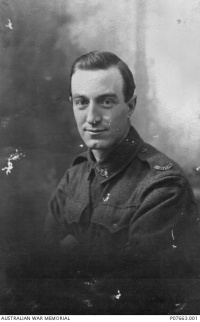George Henry Goode
From The Orange Wiki
GOODE, George Henry
Service no: 5020 [1]
Place of birth: Millthorpe, 1887
Address: Woodville, Millthorpe
Occupation: Grocer
Next of kin: William Goode (father), Woodville, Millthorpe
Date of enlistment: 15 December 1915
Place of enlistment: Orange
Age at enlistment: 28
Fate: Proceeded to Lithgow Depot Camp 30 December 1915. Proceeded to Bathurst Depot Camp 18 January 1916. Assigned to 17th Battalion, 13th Reinforcement 10 March 1916. Embarked HMAT A55 Kyarra, Sydney, 3 June 1916. Disembarked Plymouth 3 August 1916. Taken on strength, 33rd Battalion 30 September 1916. Proceeded overseas to France 21 November 1916. Proceeded to England on leave 4 March 1918. Rejoined unit, France, 20 March 1918. Killed in action, France, 2 June 1918.
Date of death: 2 June 1918, aged 30
Buried: Villers-Bretonneux Military Cemetery, Picardie, France, Plot XII, Row F, Grave 8
In the early hours of 2 June 1918 former Millthorpe grocer, George Henry Goode, was delivering canisters of hot tea to his comrades on the front line at Morlancourt near Villers-Bretonneux when an enemy shell exploded nearby, killing him instantly. George was the second member of his family to die in service; his brother Ernest Harold Goode had been killed in action in February 1917.
Born in Millthorpe in 1887, George was the seventh of ten children of farmer William Goode and his wife Elizabeth Grace nee Pascoe.
Following his education George worked as a grocer for Messrs W and E Hayes Trade Palace Stores in Millthorpe.
George enlisted in December 1915 and was assigned to 17th Battalion, 13th Reinforcements.
On 29 December 1915 the Millthorpe Methodist Church congregation farewelled a group of local soldiers – George included – on the eve of their departure for camp. Superintendent of the Sunday School, Mr Bacon, wished them well, stating:
- You are worthy sons of worthy parents. We thought a lot of you before - we think a thousand times more of you now.
- I trust that your mission will be fully realised. I think the Kaiser is sin personified, and the world should be rid of him.
The following morning many townspeople saw the recruits off from the railway station as they set off for camp at Lithgow.
In late April the privates returned to Millthorpe for final leave before embarking for overseas service. The Methodist Church hosted an evening of entertainment for the soldiers and presented each of them with a pocket bible. Mr Bacon again addressed the congregation:
- On this occasion my feelings are too great for words. These young men are going to fight for their King and country.
- I am glad that the spirit of their forefathers is strong in them. As instructor of the cadet corps which was here once,
- I just looked up the records a few days ago to see how many had enlisted, and I find that 24 out of the full strength of 30 have answered the call.
- Maybe before this terrible struggle is over we older ones will be wanted, and I for one will be there, for I would sooner die a free Britain than live a German slave.
Private Goode embarked HMAT A55 Kyarra in Sydney on 3 June 1916. He disembarked in Plymouth exactly eight weeks later, on 3 August 1916. The following month he was taken on strength with the 33rd Battalion, proceeding to France on 21 November.
In early March 1918 Private Goode was granted two weeks’ furlough in England. He rejoined his unit on the Western Front on 20 March, where he served for a further ten weeks before he was killed in action.
George Henry Goode was buried in the Villers-Bretonneux Military Cemetery at Picardie, France. He is commemorated on the Honour Rolls at the Orange Methodist Church, Millthorpe Methodist Church and on panel number 122 on the Roll of Honour at the Australian War Memorial in Canberra.
Leader, 24 June 1918, p. 6
Another Millthorpe Hero [2]


